The AgriFutures Tea Tree Oil Program, which manages the tea tree oil R&D levy, recently invested in a new project with Southern Cross University to integrate a breeding population management system (BMS) with its well established and internationally regarded breeding and clones program.
Gae Plunkett, AgriFutures Australia Manager, Research for the Tea Tree Oil Program said the investment allowed researchers to use an internationally recognised BMS to fast track genetic gains.
“By making breeding management more efficient, the BMS helped escalate efforts to identify breeding stock with better yields and lower methyl eugenol,” Ms Plunkett said.
“These traits are important for profitability and market access, particularly into international markets.”
Dr Merv Shepherd, Southern Cross University Plant Science Senior Research Fellow said the investment was important for realising gains from the breeding program for growers.
“A BMS allows us to develop and deliver transparent, reproducible and reusable analytical pipelines,” Dr Shepherd said.
“This effectively means we can work more quickly aided by technology that helps us in monitoring the progress of breeding, modelling of alternative strategies, and provides information for breeding and deployment decisions.”
Dr Shepherd said benefits included realising the anticipated genetic gains from an advanced generation breeding strategy, increased efficiency in the operation of the breeding program, and security and future proofing of breeding information.











